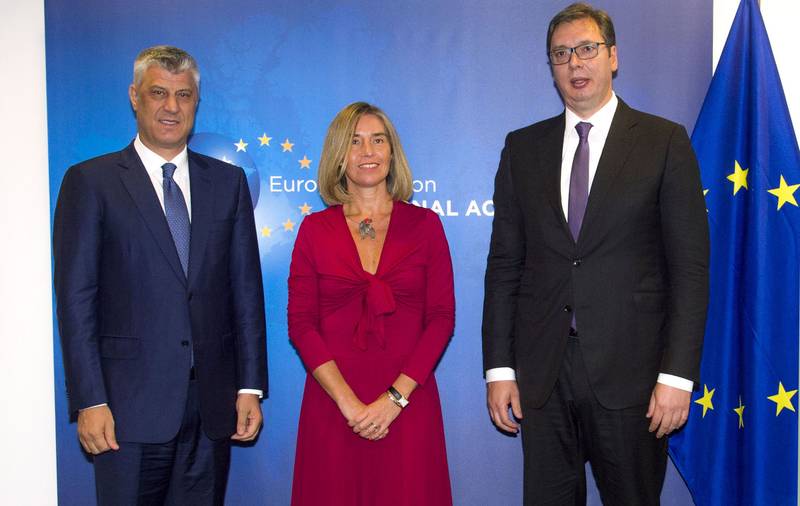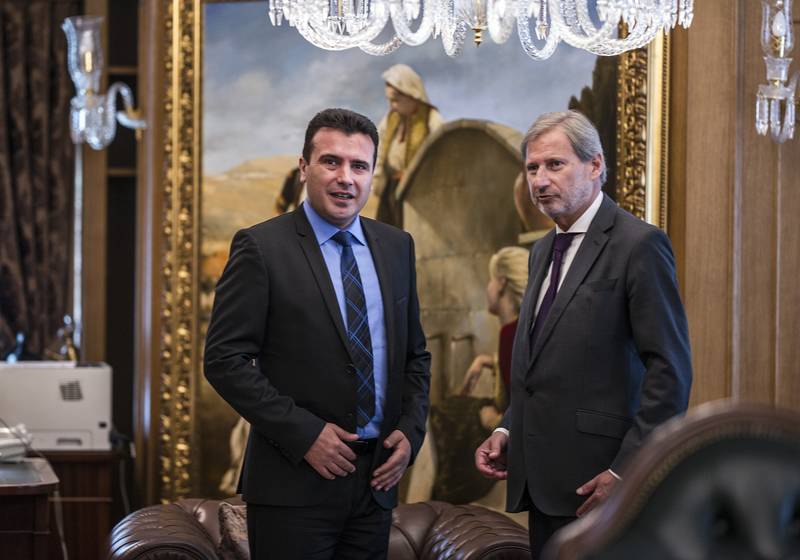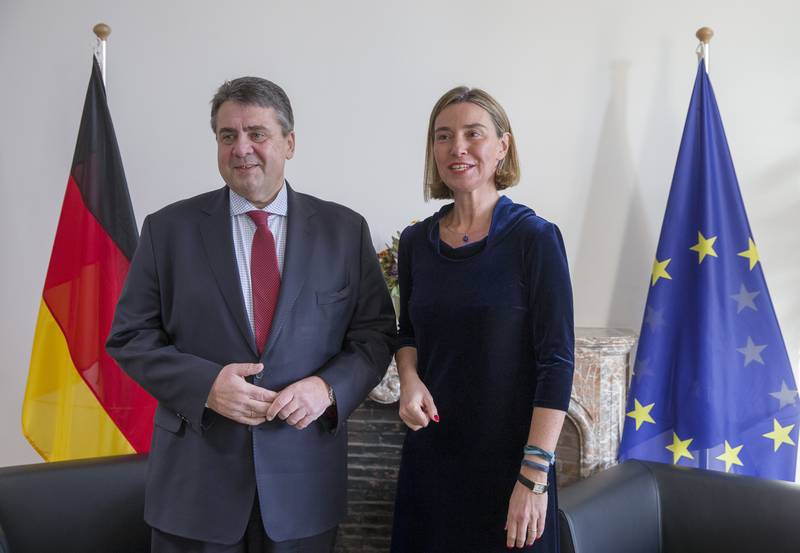The Summer of Balkan Hopes
Adelina Marini, July 12, 2017
 The grand event for the Western Balkans this year is the summit of the Berlin Process countries in the Italian city of Trieste on 12 July. In recent months, expectations have been seriously pumped up that this meeting will provide a major boost to the European integration of the region, which suffers from integration decay and heavy geopolitical headaches. The six Balkan countries in the region hope the EU will untie its purse to the scale of a Marshall Plan for the region, which would lift the poorest European relatives up on their feet and stop the constant brain drain and loss of labour force, with the Union in exchange hoping for a restart of the European integration in those countries, which have fallen victim to the virus of illiberalism and nationalism.
The grand event for the Western Balkans this year is the summit of the Berlin Process countries in the Italian city of Trieste on 12 July. In recent months, expectations have been seriously pumped up that this meeting will provide a major boost to the European integration of the region, which suffers from integration decay and heavy geopolitical headaches. The six Balkan countries in the region hope the EU will untie its purse to the scale of a Marshall Plan for the region, which would lift the poorest European relatives up on their feet and stop the constant brain drain and loss of labour force, with the Union in exchange hoping for a restart of the European integration in those countries, which have fallen victim to the virus of illiberalism and nationalism.
Following a nationalist winter, spring has come to the Balkans
Up until a few months ago, the region was causing serious alarm in Brussels and the capitals of member states because of the dangerous return of nationalist rhetoric from the early 1990s, hate speech, and a serious deterioration in relations between almost all countries in the region and their EU neighbours, with active intervention by Russia being seen under the surface. The situation deteriorated so much that it forced the EU's High Representative for Foreign Affairs and Security Federica Mogherini (Italy, Socialists and Democrats) to admit during her Balkan tour that "the Balkans can easily become one of the chessboards where the big power game can be played".
Following a heavy winter of questions often asked whether there was a new war coming to the Balkans, the situation today does not seem so desperate. There is no significant improvement in relations between the countries of the region, but the geopolitical conditions are considerably more favourable to the EU. Montenegro has finally become a member of NATO, despite Russia's fierce resistance and the coup attempts of the autumn of last year. There has also been a significant change in Macedonia. After two years of political instability, the country has finally got a government, headed by Zoran Zaev, who has set an ambitious reform agenda and plans to return the country to the European road, which also includes addressing the most serious problems that have hitherto stopped it - the name dispute with Greece and the signing of a friendship agreement with Bulgaria.
There is a certain, but also rather vague change in Serbia. Following the presidential election in April, the country's political puzzle changed. Former heavily pro-Russian president Tomislav Nikolić has stepped down from the political scene and former Prime Minister Aleksandar Vučić took his seat, who has the image of a pro-European leader in Brussels. This is a very controversial qualification, which is not necessarily false, but it has many conditions attached. Aleksandar Vučić is not tired of saying that Serbia's main goal is to become a member of the EU and works hard on opening new chapters in the negotiation process. At the same time, he has been moving his country towards illiberalism and ever closer cooperation with Russia. The presidential election, however, showed him a yellow card. More liberal and democratic political forces emerged on the political scene endangering the political domination of Vučić’s party - the Serbian Progressive Party.
Following months of uncertainty, he finally chose his heir to head the government, the young Ana Brnabić. There is no doubt that her role is to keep Vučić's control over the executive branch, but at the same time her appointment played a very positive role for Serbia's image to the West, as Ana Brnabić is Serbia's first female prime minister and besides she publicly declared herself a member of the LGBT minority. This has created expectations in the West that things are going in the right direction in Serbia, regardless of the fact that Pride parades still rather resemble military parades because of the heavy military guards. In presenting her programme to the Skupshtina, Ana Brnabić has set two priorities which are rather surprising for the region - digitisation and education.
All of this sounds rather great, but Serbia's Western-pointed stumble with Ana Brnabić has provoked sharp reactions from Russia. For days now the press is basically concerned with what exactly did she mean when she said in an interview for Bloomberg that if pressed to choose Serbia would choose the EU, not Russia, regardless of Russia remaining a close cultural friend of the Serb people. It even got to the Serbian prime minister having to deliver a shorthand copy of the interview to the Russian ambassador to Belgrade, Aleksandar Chepurin. President Vučić stood behind his prime minister saying he saw no problem in her statement. Although it is clear that Ana Brnabić will remain under Mr Vučić's control, her appointment may be a sign of  change, though cautious and slow, in Serbia, which, along with Kosovo and Bosnia and Herzegovina, is surrounded by NATO and the EU.
change, though cautious and slow, in Serbia, which, along with Kosovo and Bosnia and Herzegovina, is surrounded by NATO and the EU.
Now is the time for the EU to take advantage of these changes and respond appropriately, as there are still many problems - the relations between Serbia and Kosovo, the situation in Kosovo itself and in Albania too. Nothing of what has been achieved can be taken for granted and irreversible.
Berlin+
There is also a big change on the part of the EU. On May 31 in Berlin, German Foreign Minister Sigmar Gabriel delivered a speech, which was commented for months in the Balkans and beyond. In it, he made several important findings, such as "countries from outside the region try to re-establish spheres of influence through old geopolitical thinking", or that "we can’t simply continue doing things as we did before". In his speech, he made it clear that it is necessary to change the narrative about the EU in the region. "Of course, it also doesn’t help either when the impression is created that Europe is primarily attending to its own affairs and does not care enough about the Western Balkans", he said and called for the narrative of the EU to adapt to reality.
This also includes an increase in EU visibility. Sigmar Gabriel has encountered an old paradox in Belgrade during his visit there earlier this year: "I don’t understand why one is greeted on the trip from Belgrade Airport into the city centre by a large poster that celebrates the Russian-Serbian friendship, while the yellow and blue of the European Union is totally invisible." Moreover, he said, Serbs live with the impression that Russia is Serbia's largest financial donor. Germany's top diplomat also announced the “Berlin+” plan, which includes a serious EU financial commitment, the aim of which is to bring the Western Balkans back on the right track.
The extent to which Sigmar Gabriel was on the right track was evident from the fact that his idea has been floating around for months in Serbian media and around the Balkans in general. For the first time in a long time, news from/about the EU prevailed over those from/about Russia. For weeks, the only talk was about how much money the EU would give, that it would be a Marshall Plan of sorts, what projects are to be funded, and so on. This is quite a rare phenomenon, especially on the Serbian media scene where Russia is most often present with comments from Ambassador Chepurin or Foreign Ministry spokesperson Zaharova on all topics, and a close second is the United States, embodied by Deputy Assistant Secretary Brian Hoyt Yee, who is entrusted with the mission of taking care of the Balkans. His opinion is also often present in Serbian media, and the EU participation is limited to opening or blocking of chapters.
The “Berlin+” plan is expected to be officially presented by the European Commission namely in Trieste today (July 12). The sum in question is not quite clear. There is talk of a "substantial new funding", which will be part of the annual connectivity package. It is also expected that the treaty for the Transport Community will be signed, which will finance the integration of transport networks in the region. Sigmar Gabriel's words from back in May make it clear that work will be done to build motorways between Serbia, Kosovo and Albania, which will be funded by an additional Infrastructure fund.
Another important initiative expected to be officially announced in Trieste is the creation of a regional economic zone, which has also been discussed in the Balkans for months, and has even been a cause for renewed tension. The idea was launched for the first time this spring in Sarajevo, interpreted as an initiative by Aleksandar Vučić for the creation of a regional market following the model of the European single market. However, some countries, such as Kosovo and Macedonia, have seen attempts to regain Serb dominance in the region, or an attempt to replace EU membership with a regional initiative. Others support the idea, headed by the EU Commissioner for Enlargement Negotiations and Neighbourhood Policy Johannes Hahn (Austria, EPP).

What is to be presented on Wednesday is an economic zone whose goal will be to boost the region's attractiveness for investment. As Sigmar Gabriel warned in March, however, such an initiative would be successful only if work is done on establishing the rule of law in these countries, as investors will not want to invest if they do not have legal certainty. Another idea on which the Bulgarian EU Council presidency, that starts on 1 January, is working on is the abolition of roaming charges in the Western Balkans. According to a high-ranking Bulgarian diplomatic source, there is already talk about this with the newly appointed Bulgarian EU commissioner Maria Gabriel (EPP), who is responsible for the EU's digital policy. The aim is to start a discussion on the topic first and then to come up with a concrete plan, which would be a part of the idea of a regional economic zone, the source told euinside.
The idea is not new, but it also has a favourable environment available after the abolition of roaming charges within the EU itself. Several years ago, telecoms in the Western Balkan countries had attempted to agree to the removal of roaming charges in the region or at least to lower prices, but that ended with no result.
As is usually the case at Berlin process summits, it is inevitable that the strained bilateral relations emerge. It is possible that the issue of the border dispute between two parties in the Berlin process - Slovenia and Croatia - will attempt to take over the agenda, as it happened at the annual Dubrovnik forum a week ago. Expectations, however, are that economic benefits will prevail over petty Balkan quarrels. This can only happen if the amount of the financial commitment turns out to be serious enough. This package has the potential to be game changer in the region.
The countries in the Berlin Process from the EU side are Germany, France, Austria, Italy, Slovenia and Croatia. The Trieste summit will be a debut on the international stage for Serbian Prime Minister Ana Brnabić. Next year will be the last meeting for the Berlin process. It will take place in London. Some have already expressed scepticism and even criticised the idea that a leaving Britain would host such a forum. But this is unjustified criticism. Britain has always been heavily engaged in the Western Balkans, and there is no reason for it to change its policies towards this region even after exiting, as Prime Minister Theresa May's behaviour has clearly shown in recent months.
What is more, holding the summit in London is a strong signal for the future foreign-policy relations of the UK and the EU. London hosting it is also a good example of the fact that EU developments should not be overly dramatised. If countries are aware of their national interests and strategic goals, dialogue and mutual cooperation are fully possible. Something the Western Balkan countries still fail to learn.
Translated by Stanimir Stoev
 Bakir Izetbegovic, Andrej Plenkovic | © Council of the EU
Bakir Izetbegovic, Andrej Plenkovic | © Council of the EU Aleksandar Vucic, Recep Tayyip Erdogan | © Serbian Presidency
Aleksandar Vucic, Recep Tayyip Erdogan | © Serbian Presidency Jean-Claude Juncker, Zoran Zaev | © European Commission
Jean-Claude Juncker, Zoran Zaev | © European Commission